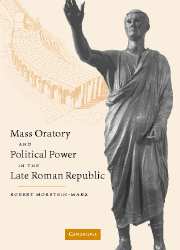Book contents
- Front Matter
- Contents
- List of figures and maps
- Acknowledgments
- Note on translations
- List of abbreviations
- 1 Introduction
- 2 Setting the stage
- 3 Civic knowledge
- 4 The Voice of the People
- 5 Debate
- 6 Contional ideology: the invisible “optimate”
- 7 Contional ideology: the political drama
- 8 Conclusion
- References
- Index
7 - Contional ideology: the political drama
Published online by Cambridge University Press: 22 September 2009
- Front Matter
- Contents
- List of figures and maps
- Acknowledgments
- Note on translations
- List of abbreviations
- 1 Introduction
- 2 Setting the stage
- 3 Civic knowledge
- 4 The Voice of the People
- 5 Debate
- 6 Contional ideology: the invisible “optimate”
- 7 Contional ideology: the political drama
- 8 Conclusion
- References
- Index
Summary
Disillusioned by the failure of a flurry of progressive legislation in the United States to live up to its promise, the American political theorist Murray Edelman formulated a “symbolist” model of democratic politics, which he laid out in three thought-provoking, now classic works published between 1964 and 1977. Edelman sought to construct a model of modern democratic politics that would explain how formally democratic political regimes can survive, even flourish, despite the continual failure of their policies to produce real and lasting benefits for their voters. He took the perspective that functionally, if not in theory, modern “democratic” politics was best seen as a kind of symbolic manipulation whereby ruling élites engineer the acquiescence of the mass and thus perpetuate their power. They do so, in Edelman's view, not by actually solving problems but by staging dramas of problem-solving, to which the public responds with anxiety at the dangers confronted and acquiescence in the efforts of their leaders to assuage that anxiety. At the core of theory is the idea that
Political “events” … are largely creations of the language used to describe them. For the mass of political spectators, developments occur in a remote area where there can be no direct observation or feedback. The bewildering political universe needs to be ordered and given meaning. People who are anxious and confused are eager to be supplied with an organized political order – including simple explanations of the threats they fear – and with reassurance that the threats are being countered.
- Type
- Chapter
- Information
- Mass Oratory and Political Power in the Late Roman Republic , pp. 241 - 278Publisher: Cambridge University PressPrint publication year: 2004
- 1
- Cited by



